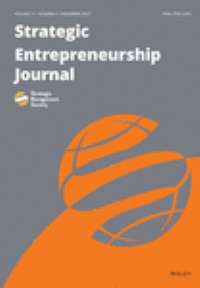Is Cain more able? A behavioral perspective on the relationship between family CEO birth order and family firms' CSR
IF 6.3
2区 管理学
Q1 BUSINESS
引用次数: 0
Abstract
Research SummaryWe investigate family CEO birth order as an antecedent of family firms' CSR behavior. Despite psychology literature recognizing it as a key predictor of individual behavior, birth order has been largely neglected in management research. Drawing on behavioral economics and evolutionary psychology—specifically, the Family Niche Model—we identify economic and social preferences as two competing channels through which birth order effects propagate to CSR behavior. An unbalanced panel dataset of 550 firm‐year observations from 84 family firms between 2010 and 2022 reveals a negative relationship between family CEO birth order and CSR behavior, pointing to the dominance of the economic channel, whereby the higher risk tolerance among later borns manifests. This relationship is positively and negatively moderated by family CEO sibship size and age, respectively.Managerial SummaryWe examine the role of family CEO birth order in shaping family firms' CSR behavior considering that individuals' economic and social preferences are strongly influenced by their birth order. The results show that family CEO birth order negatively relates to CSR behavior. We argue that this relationship is driven by higher risk tolerance among later‐born family CEOs, who are consequentially less inclined to adopt CSR behavior as a risk‐mitigating strategy. The relationship is attenuated by family CEO sibship size and amplified by CEO age. Our study cautions family firms concerned with CSR to carefully consider the implications of birth order when selecting family members for the CEO position. Concurrently, family CEOs should be aware that their early family experiences may affect their CSR decisions.该隐更能干吗?家族CEO出生顺序与家族企业社会责任关系的行为视角
研究摘要本研究考察家族CEO出生顺序对家族企业社会责任行为的影响。尽管心理学文献认为出生顺序是个体行为的关键预测因素,但在管理研究中,出生顺序在很大程度上被忽视了。利用行为经济学和进化心理学——特别是家庭生态位模型——我们将经济偏好和社会偏好确定为两个相互竞争的渠道,通过这两个渠道,出生顺序效应传播到企业社会责任行为。2010年至2022年间,来自84家家族企业的550家公司年观察数据的不平衡面板数据集显示,家族CEO的出生顺序与企业社会责任行为之间存在负相关关系,表明经济渠道占主导地位,由此显示出较晚出生者更高的风险承受能力。这一关系分别受家族CEO兄弟姐妹规模和年龄的正向和负向调节。考虑到个人的经济和社会偏好受到出生顺序的强烈影响,我们研究了家族CEO出生顺序在塑造家族企业社会责任行为中的作用。结果表明,CEO家庭出生顺序与企业社会责任行为负相关。我们认为,这种关系是由较晚出生的家族ceo更高的风险容忍度驱动的,他们因此不太倾向于采用企业社会责任行为作为风险缓解策略。这种关系随CEO家族规模的减小而减弱,随CEO年龄的增大而增强。我们的研究提醒关注企业社会责任的家族企业在选择家族成员担任CEO时要仔细考虑出生顺序的影响。同时,家族ceo应该意识到,他们早期的家庭经历可能会影响他们的企业社会责任决策。
本文章由计算机程序翻译,如有差异,请以英文原文为准。
求助全文
约1分钟内获得全文
求助全文
来源期刊

Strategic Entrepreneurship Journal
Multiple-
CiteScore
11.10
自引率
1.60%
发文量
31
期刊介绍:
The Strategic Entrepreneurship Journal is a research journal that publishes original work recommended by a developmental, double-blind review process conducted by peer scholars. Strategic entrepreneurship involves innovation and subsequent changes which add value to society and which change societal life in ways which have significant, sustainable, and durable consequences. The SEJ is international in scope and acknowledges theory- and evidence-based research conducted and/or applied in all regions of the world. It is devoted to content and quality standards based on scientific method, relevant theory, tested or testable propositions, and appropriate data and evidence, all replicable by others, and all representing original contributions. The SEJ values contributions which lead to improved practice of managing organizations as they deal with the entrepreneurial process involving imagination, insight, invention, and innovation and the inevitable changes and transformations that result and benefit society.
 求助内容:
求助内容: 应助结果提醒方式:
应助结果提醒方式:


